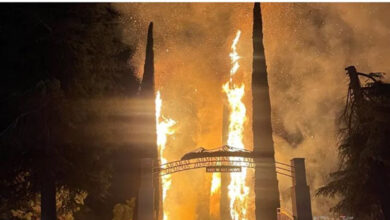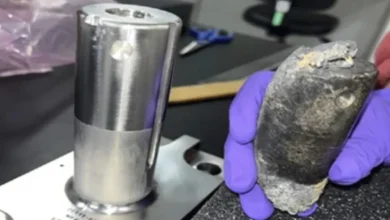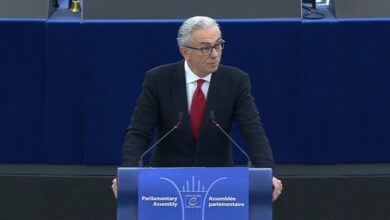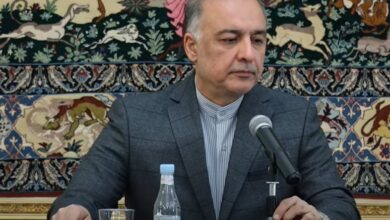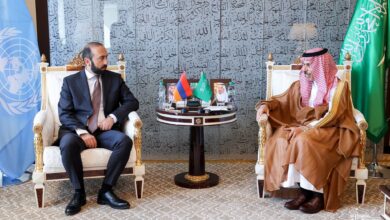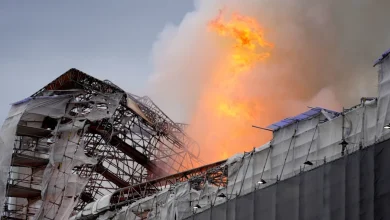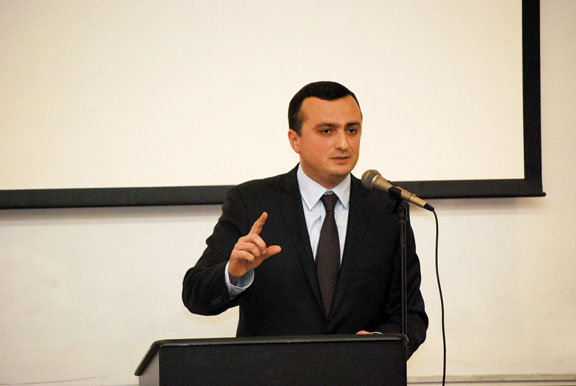
Members of Fresno’s Armenian community were joined by representatives of the offices of U.S. Congressmen Jim Costa and Devin Nunez to hear Robert Avetisyan, Representative of the Nagorno-Karabakh Republic to the U.S. speak at California State University, Fresno, Asbarez reports.
Weeks prior to the lecture, which was sponsored by the Fresno State Armenian Studies Program and the Armenian National Committee of America-Central California as well as the Armenian Students Organization, emails and letters to the editor sparked the interest of the community to hear Avetisyan.
The local newspaper, The Fresno Bee also published an op-ed written by him to give background of the situation in Nagorno-Karabakh.
“The Karabakh liberation movement began on February 20th 1988 when the Nagorno-Karabakh Council of Deputies applied to the Supreme Councils of Soviet Armenia and Azerbaijan for a decision on reunification of Nagorno-Karabakh with Armenia,” said Barlow Der Mugrdechian, Coordinator of the Armenian Studies Program at Fresno State as he invited Avetisyan to the podium.
It was Avetisyan’s first trip to Fresno, which he noted shared the same weather as his homeland. The time prior to the lecture was spent visiting Armenian monuments in Fresno, including the William Saroyan bust and the David of Sassoun statue.
“Karabakh is interested in having global awareness about us because we are sure that our cause is right, we have a very strong legal, historical and moral basis for claiming the right to live in freedom and dignity,” stated the Representative, who immediately got the attention of the audience with his comments.
The current situation of Nagorno-Karabakh started in 1921, when former dictator Joseph Stalin carved out the republic from Armenia and placed it under the administration of the newly created Soviet Azerbaijan Republic. This was the only time in history that Nagorno-Karabakh was under the territory of Soviet Azerbaijan as part of the Soviet Union.
This wrongful placement was never accepted by the citizens of Nagorno-Karabakh, 97% of whom were Armenians at the time of the distribution. For decades, Soviet Azerbaijan did whatever it could to change the demographic situation. In 1989, because of systemic population increases by the Azerbaijan, the Azeri population in the region was up from 3% to 21%. The apparent intention of Azerbaijan was to eliminate anything resembling an Armenian existence – a policy that had been successfully implemented by Azeris in Nakhijevan, where, for instance, thousands of ancient Armenian monuments and cemeteries were destroyed and replaced by military training sites.
On many occasions, the people of Nagorno-Karabakh raised their voices, requesting restoration of justice but the Soviet authorities declined their requests. The most recent attempt took place in 1988, when new Soviet leader Gorbachev pledged more democracy. Soviet Azerbaijan reacted negatively to this movement for freedom. Hundreds of Armenians were subjected to torture and murdered simply for being Armenian. Organized mobs armed with knives and sharpened rods attacked apartments that belonged to Armenian families and conducted targeted atrocities with the full support of law-enforcement authorities in the large industrial city of Sumgait, hundreds of miles away from Nagorno-Karabakh.
In 1991, the people of Nagorno-Karabakh acted under existing laws and declared the formation of the Nagorno-Karabakh Republic. Their goal was to be a sovereign nation. “Azerbaijan replied with full scale military aggression, which was predictable,” said Avetisyan of the move for freedom. Despite being outnumbered by soldiers and rough terrain, the Nagorno-Karabakh military was able to force a cease-fire, signed by Azerbaijan, Armenia and themselves. The war left the social and economic infrastructure of the Republic in ruin. Today, much has been done to rebuild what was destroyed by the Azerbaijani military.
“We found that Karabakh is rich in gold, in coal and in copper and mining companies are the #1 tax payers,” said Avetisyan referring to revenue streams of the economy. “We are doing everything to minimize the impact on the environment,” he continued. These taxes and natural resources are helping build the economy and people are noticing. For the seventh consecutive year, the population has seen an increase.
Tourism is also on the rise. Last year 16,000 tourists visited the Republic. Knar Kahkejian, an Armenian born in Pasadena, CA has visited Nagorno-Karabakh and actually lived there for 2-weeks volunteering her time. Of the experience, she said, “I gained insight on what Artsakh (Armenian name for Nagorno-Karabakh) was all about and what it could offer the Diaspora and myself. There was so much I learned about the region and its history, just by sitting and conversing with Dadik who lived next door.” At the end of the lecture, she asked one of the countless questions to Representative Avetisyan. Like many, she was impressed by the turn out. “It proved to me that the people of Fresno are in fact interested in the welfare of Artsakh and what is currently occurring in the region.”
Today, although a peace treaty is still in effect, threats continue from Azerbaijan to resort to military action to take back the Republic. “The biggest challenge facing Karabakh is Azerbaijan’s aggressive stance,” said Avetisyan. “Every day from various media sources, Azerbaijan states that they are going to sell more oil and buy more arms,” he continued.
“They think they can scare us or force us to leave…it is not working,” said Avetisyan. “We are trying to get in touch with them and free their society from this poison,” he continued. Poison it is. Two recent examples show just how much hatred Azerbaijan’s government has against Armenia and Armenians.
Last year convicted murderer Ramil Safarov, who was found guilty of murdering Armenian serviceman Lt. Gurgen Markarian, was pardoned by Azerbaijan who proclaimed him as a hero, giving him countless benefits and back pay. Another example is of writer Akram Aylisli, a respected Azerbaijani author who was stripped of his state honors and pension for saying Azerbaijan needs to apologize to the Armenians. A $12,500 reward was offered for anyone who would cut the author’s ear off.
Despite this unpredictable neighbor, things are looking more positive in Nagorno- Karabakh. Watchdog organization Freedom House rated it as a “partly free” nation, which is much better than other regional countries. “Today we have a viable state…the population is growing,” said Avetisyan. “We still invite the international community to share and teach us how to do things better,” he continued.


